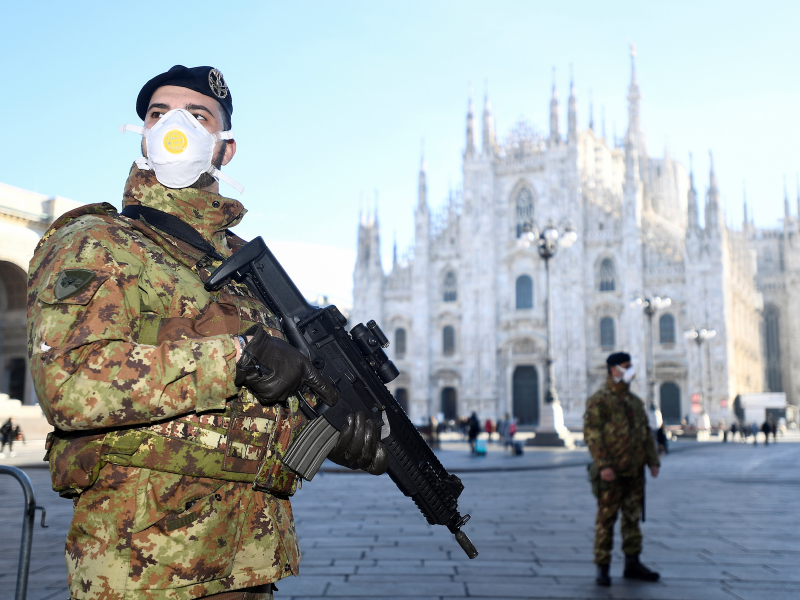- International tourism is taking a hit as the coronavirus outbreak – and fear about it – spreads across the world.
- National governments are warning would-be travelers to stay away from outbreak hotspots, and in some cases, enacting travel bans to forbid them from going.
- Photos of tourist destinations around the world – emptied-out festivals, vacant churches and temples, and quarantined luxury hotels – show the impact of the coronavirus outbreak.
- Visit Business Insider’s homepage for more stories.
International tourism is slumping as the coronavirus outbreak spreads internationally.
In China, Italy, and South Korea, governments are quarantining towns and cities and shutting down transportation. The US has issued travel warnings for anyone considering visiting Italy, China, Iran, Japan, and South Korea.
This has all put travelers on high alert, and many are electing to stay home.
The virus, which originated in Wuhan, China, has killed more than 2,770 people and infected more than 81,000 in the last two months. It has spread to 40 countries other than China. (For the latest case total, death toll, and travel information, see Business Insider’s live updates here.)
The outbreak is eating away at the revenue of tourist destinations around the world. The international tourism industry was valued at $1.7 trillion in 2019 by the United Nations, but the coronavirus is expected to cost the US travel industry alone more than $10 billion over the next four years.
These images of popular tourist hotspots show what the slowdown looks like on the ground.
Italy saw its first cases of coronavirus on January 31, but the number began to spike mid-February during the Venice Carnival, which attracts thousands of visitors each year.

Source: Reuters.
Italian authorities ended the 14-day event three nights earlier than planned. The number of cases in Italy has since risen to 325, and 12 people have died.

Italian officials are still trying to trace the source of the outbreak.
Italy imposed strict quarantine restrictions on 10 towns in two northern "hotspot" areas: the Lombardy and Veneto regions (where Milan and Venice are located, respectively).

Approximately 50,000 people are under lockdown.
The quarantines have forced schools, businesses, and restaurants to close. Sporting events and masses have been canceled.

Italian Prime Minister Giuseppe Conte said the quarantine could last for longer if necessary.
Italy's police, and if necessary its armed forces, have the authority to ensure the regulations are enforced, the BBC reported.

Source: BBC.
Italy was the fifth-most visited country in the world in 2018, right behind China, according to the World Tourism Organization.

Tourists in Italy spent about $45.7 billion (€42 billion) in 2018, according to the Bank of Italy. The coronavirus outbreak and declines in tourism are prompting fears of a recession there.
However, at the end of January, Italy suspended flights to and from China, Hong Kong, Macau, and Taiwan.

Source: The Straits Times.
An Italian tourist and a companion staying on the island of Tenerife, one of the Canary Islands, tested positive for the coronavirus after coming down with symptoms on Monday. Now nearly 1,000 people are under lockdown in the hotel.

The man is a doctor from Lombardy, Italy, which is the center of the worst outbreak in Europe.
He reported flu-like symptoms to health authorities on Monday afternoon. By then, he'd been at the hotel for a week with his wife, according to Diario de Avisos.
The diagnosis came shortly after seasonal sandstorms hit the islands in what Canary Islands president Ángel Víctor Torres called a "nightmare weekend."

Source: Business Insider.
Because more than 50 million people in China are under quarantine, many would-be Chinese tourists cannot travel.

The domestic tourism industry in China and Hong Kong is giant - the Chinese government said domestic tourist trips within the country totaled to $5.54 billion in 2018, according to state outlet Xinhua Net.
Hong Kong, a city of 7.5 million, has 79 confirmed cases. Health officials there have closed 10 of 13 border checkpoints with mainland China.

Travelers from mainland China to Hong Kong are required to undergo quarantines.
Hong Kong authorities are also trying to repatriate residents from mainland China. Approximately 2,000 have contacted the government (many in the Hubei province, where Wuhan is located) wanting to get back to Hong Kong.

The Hong Kong government will require repatriated residents to undergo a 14-day quarantine as well.
Hong Kong's Disneyland, which closed in January due to the outbreak, agreed to let the government use some of its land to quarantine people.

Hong Kong Disneyland agreed to let the Hong Kong government build quarantine units on a vacant site that the resort was planning to use for a future expansion.
Travel bans have also meant that some Chinese tourists who were on vacation cannot get back home.

Indonesia banned flights to and from mainland China on February 5 and barred visitors who'd been in China in the prior 14 days from entering or traveling through the country, according to Reuters.

Source: Reuters
On Friday, the South Korean government said it had failed to keep the virus out of the country and was focusing on containment.

South Korea has 433 confirmed cases. Amid the rapid uptick, airlines restricted flights to Daegu, the city at the center of the outbreak. The local government has encouraged residents to self-quarantine.
In Seoul, where seven coronavirus cases have been recorded so far, gatherings at three main squares have been banned.
Thailand's Tourism Authority predicted on January 28 that the number of Chinese tourists there could fall by 2 million to 9 million due to the coronavirus outbreak.

Last year, nearly 11 million Chinese tourists traveled to Thailand.
Reduced travel from China could result in an estimated $1.52 billion loss of revenue, the Thai Tourism Ministry said.

Source: Reuters.
Thailand has 40 confirmed coronavirus cases.

Thai authorities are requiring that Chinese tourists who do visit present medical records showing that they do not have the coronavirus.

Source: Bloomberg.
Thailand's public-health minister, Anutin Charnvirakul, urged caution for Thai residents considering travel. "Even though tickets are cheap, it could be your last holiday," he said at a press conference, according to the Bangkok Post.

